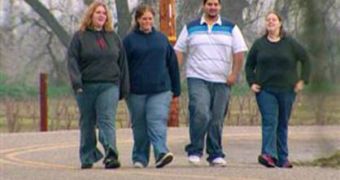The spread of the obesity pandemic in the young population around the world is very troublesome, researchers say, especially because no one really knows what's causing it. Among the suggestions, too much sedentary time, as in watching TV and using computers all day long, coupled with an inappropriate diet, high on carbohydrates, proteins and sugar-filled products, may be the leading causes of teen obesity. However, a new study highlights the fact that a poor sleep hygiene, together with an increased use of technology and a massive intake of caffeine, may also contribute to the problem.
Snoring is one of the key elements in analyzing the quality of sleep. The more, the worse, researcher say, as it is a clear indicator that something is amiss with the body. Before bed, more and more teens are consuming either sodas or energy drinks and coffee, which stimulate their brain during the night, and so they get only a limited amount of disturbed sleep. During the hours they do catch forty winks in, they often tend to sweat and move around a lot, not being able to enjoy the full benefits of sleeping.
Amy Drescher, PhD, a research specialist at the University of Arizona in Tucson (UAT), said that, in a new investigation, the body mass index (BMI) of test subjects was directly associated with the number of hours each of them slept per night. The discovery will be presented today, June 9th, at the 23rd Annual Meeting of the Associated Professional Sleep Societies, dubbed SLEEP 2009. Drescher has been the lead author of the new study.
“Boys had significantly more vigorous exercise, recreational activity than girls. The sleep and obesity connection is not always seen because factors such as exercise may keep weight in check,” she said. The researcher also underlined the fact that more hours of screen time, when teens used the computer, the Internet, video game consoles, or the TV, also had a detrimental effect on the amount of sleep they got every night, which in turn might be making their conditions worse.
The study, which followed 320 children aged at an average of 13.3 years, found that higher caffeine intakes, coupled with more screen times, had the potential to adversely affect the teens' sleep patterns, health, as well as academic performances. The researchers also said that the trend in which children were allowed to drink coffee and energy drinks at such a young age was also very concerning.

 14 DAY TRIAL //
14 DAY TRIAL //